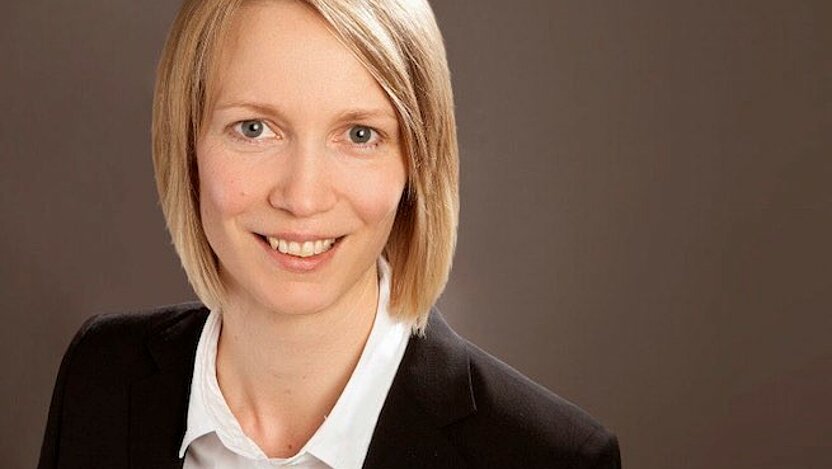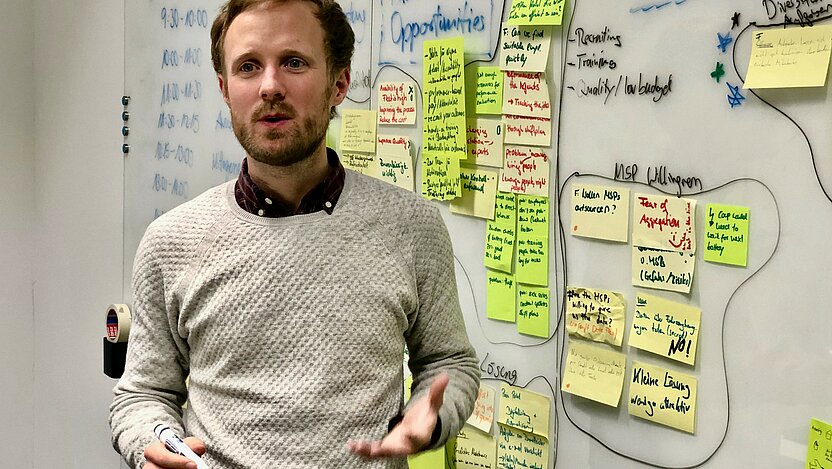Will you tell us something about your career so far?
My studies of psychology first led me to beautiful Regensburg. After my diploma in psychology, I spent some years in Boulder, Colorado, where I received my doctorate on a topic from decision psychology. I focused on the question of how reflecting on decision processes can change and possibly improve our decisions. After my return to Germany, I worked at the TU Dresden in the field of social psychology in teaching and research, before I became involved in the selection and diagnostics of gifted students at the Studienstiftung, the largest sponsorship organization for the academically gifted in Germany.
What brought you exactely to Neu-Ulm and HNU?
The chance to help develop the new study programme in Business Psychology, and to work with colleagues to shape the range of courses on offer for students with a wealth of ideas and commitment. The fact that the region offers so many opportunities for practical experience for students, but also cooperation with companies for applied research, also convinced me. But the friendly and familiar atmosphere was also very important, which ultimately led me to HNU.
How were your first months at HNU?
My first few months at HNU were marked by the warm welcome I received from the many colleagues who were always friendly and helpful in answering questions and helping me with my first orientation at HNU. My first time at HNU was also determined by the quick introduction to online teaching and the use of the various tools that are used, as well as the support of HNU in this respect. Above all, I got to know many nice colleagues in the past weeks and months through online meetings and our first year of students in Business Psychology. I am very enthusiastic about the experiences I have had so far and I am of course already looking forward to hopefully meeting you all personally soon!
Why did you become a professor?
Since my time as a doctoral student I have enjoyed teaching and my role as a lecturer. I try to pass on my own enthusiasm for the subject of psychology and its versatile application possibilities to the students in my courses. In addition, I enjoy developing research ideas together with colleagues – especially psychology, which tries to explain human behaviour and experience, offers many possibilities for research on applied questions with a wide range of disciplines.
What are the focal points of your research and teaching?
My main interest is to better understand human judgements, attitudes and decisions and to influence them by appropriate measures. At present, I am particularly interested in the significance of glances and lines of sight in the field of non-verbal communication and how these affect attitudes, e.g. the evaluation of products or slogans. I am also interested in personnel selection and especially in the methods of interview and test. In teaching, my focus in the basic area is on social psychological content, such as attitudes and attitude change, perception of people or social identity. In the application area, my focus is primarily on organizational psychology and negotiation skills.
What can be learned in your lectures?
In my current lecture you get an overview of the field of psychology. My students get to know the history of the subject, the importance of empirical methods, the fields of application and the whole range of the subject from bio-, learning-, motivational-, up to personality and social psychology. At the same time, the students also gain experience with their own small study, the topic of which the students have chosen themselves. We evaluate the results together.
PERSONAL DETAILS
When I'm not researching and teaching at HNU ...
... I explore the surroundings by bike, go climbing or plan my next trip.
My field of expertise in three words:
... understanding human behaviour
HNU is ...
... a modern International Business School and an university which welcomed me very friendly
This sentence I like to hear best from my students:
„I have another question about this!“
Current reading:
"Good Habits, Bad Habits: The Science of Making Positive Changes That Stick" (Wendy Wood)
My next publication will be ...
... an investigation into the meaning of glances and how they can change our attitudes
Will you tell us something about your career so far?
I studied psychology at the universities of Heidelberg, Cornell (USA), and Melbourne (Australia), graduating with a degree in psychology. Subsequently, I did my doctorate (Dr. phil.) at the Chair of Social Psychology at the University of Heidelberg on the question of how the context of a consumer decision influences its outcome.
I worked for Unilever and Bosch in the fields of market and user research, business development and strategy, and as a coach and moderator for design thinking projects. The most exciting task was the development of a corporate start-up in the field of digital mobility services (bundling of many different shared mobility offers in only one single app).
Since February of this year I am Professor for Business Psychology at HNU.
What brought you exactely to Neu-Ulm and to HNU?
I studied psychology at the universities of Heidelberg, Cornell (USA), and Melbourne (Australia), graduating with a degree in psychology. Subsequently, I did my doctorate (Dr. phil.) at the Chair of Social Psychology at the University of Heidelberg on the question of how the context of a consumer decision influences its outcome.
I worked for Unilever and Bosch in the fields of market and user research, business development and strategy, and as a coach and moderator for design thinking projects. The most exciting task was the development of a corporate start-up in the field of digital mobility services (bundling of many different shared mobility offers in only one single app).
Since February of this year I am Professor for Business Psychology at HNU.
How were your first months at HNU?
My very first semester at HNU was of course different from what I imagined. But I think that many people have imagined the present time differently - this certainly affects many students, especially those who have just started from scratch. What helped me a lot in any case was the collegial atmosphere at the university.
My assessment is that HNU and the university landscape in general is doing very well in the current situation. The digital teaching with lectures with audio lectures, zoom conferences, homework and short videos actually works quite well under the circumstances.
Only with the exams did we have a hard time. That was surprising for me. I think it's a pity that so many legal frameworks have a negative impact on some of the things that might seem sensible in such an exceptional situation.
Why did you become a professor?
I have always been fascinated by scientific work – you really have the time to get to the bottom of issues. I find many psychological topics simply incredibly exciting and I am pleased that it is now my professional task again to deal with this subject in depth.
I am also convinced that there are few professions in which you can work as independently as at university – a clear advantage!
What are the focal points of your research and teaching?
My research focuses on how the context of a decision influences the outcome and which processes ultimately underlie it. Specifically, I have investigated how attention processes take place during the evaluation of products and how one's own product is perceived as more attractive depending on which other products are still available. I am convinced that with a solid understanding of such decision processes, many everyday decisions can also be made more transparent and fairer (e.g. in organ donation or medical interventions).
In teaching, I am naturally interested in much more topics. For me, one of the strengths of psychology is that everyday phenomena can be explained on the basis of a deep understanding of human biology and cognitive architecture. This naturally creates very reliable insights into human behaviour and experience - this is exactly what I try to convey in teaching.
What can be learned in your lectures?
I am always very pleased to see when students not only understand a content, but also internalize a way of thinking. Every subject, but certainly every lecturer, has his or her own style, which to a certain extent is conveyed en passant in teaching. These are the things that you cannot simply look up later in the book; the things that hopefully will be available to you as a tool for life.
In this respect, I myself have benefited greatly from my doctoral supervisor, who is truly an inspiration in critical thinking. Such metacognitive skills are the most important thing you can take away from your studies, especially nowadays.
PERSONAL DETAILS
When I'm not teaching and researching at HNU...
... I play music! I intend to play the piano at least for a short time every day.
My field of expertise in three words:
... people, decisions, thought processes
HNU is ...
... my new academic home
This is the sentence I like to hear best from my students:
"It was not quite so simple, but I really learned a lot."
Current reading:
"Glasperlenspiel" (Hesse) – now, in times of social isolation, I'm just reading books that I liked very much in the past to see how they affect me today
My next publication will be ...
... „Inferential Latitude: Degrees of Freedom for Social Projection” – a manuscript that I can finally take up again!

![[Translate to English:] (opens enlarged image) [Translate to English:] (opens enlarged image)](/fileadmin/_processed_/7/c/csm_Collage_Sommersemester_6a6c82f0e0.jpg)








